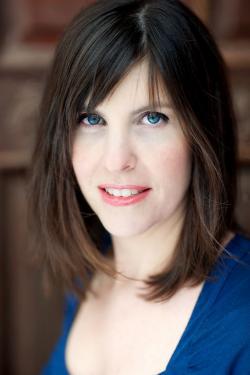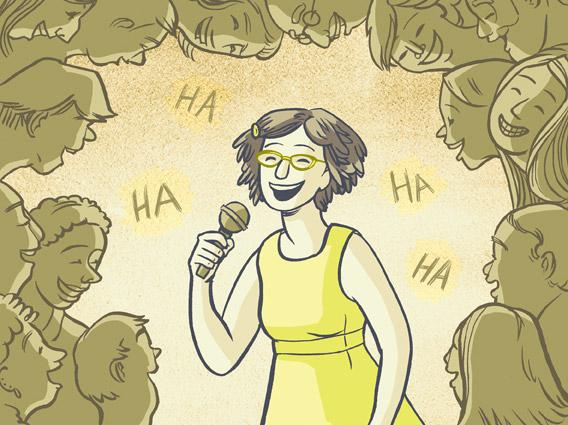The crowd at that East Village stand-up show in February of 2011 was small but the host riled them up. By the time I got on stage for my eight-minute set, the audience was loose, so I riffed a bit about the comics who’d gone before. I engaged one audience member whom the host had teased for being preppy.
Then I started my planned set. My first two jokes, both fairly clean, were met with smatterings of laughter. I did another, more solid joke about being bisexual, which went well. I launched into the setup for my next joke, about my then-boyfriend. From the back, someone yelled, “Does your boyfriend know?” referring to my bisexuality. I laughed and said that he did, keeping the atmosphere loose and attributing the heckling to a nonmalicious person just having fun. Thanks to the bright lights up on the stage, you can’t really see the audience, so I had no idea who was yelling.
I continued the joke, and the same voice yelled again—this time, something homophobic and misogynistic. On stage, I was confused. I said, “Sir, if you’re gonna talk to me, you need to come to the front because I can’t see you.” It was a huge, rookie mistake.
I could definitely see him now. He was a crazy mess of a man, a smirking ball of smarm with jagged hair and dirty hands. He started to get on stage with me but I quickly gestured for him to sit in the front. Throughout my set, he continued talking to me, making lewd comments, leering, and completely derailing my act. At one point, he took out a digital camera and asked if I wanted to see some photos.
“Sir,” I said, just barely keeping it together. “I’m going to do my last joke and it’s going to be great and you’re going to shut the fuck up, OK?” He nodded, but then as I started my joke, he shouted more disgusting phrases.
Despite being kicked out by the hosts, the heckler waited for me at the bar after the show. In a panic, I texted my boyfriend to come get me at the venue, and went outside to wait for him. When my boyfriend got there, I grabbed his hand to walk away, and the door to the bar opened. From inside I heard the heckler’s voice: “Byyyyye.”
That night, I was enraged and defeated. In an attempt to feel less helpless, I posted on my personal blog:
Right now, I feel: beaten, destroyed, helpless, weak, ashamed for being so scared, shocked, worthless, less than, and terrified. I feel like maybe I overreacted but then it’s that concept of Schrodinger’s Rapist, where I don’t know what would have happened. I also feel like I never want to do comedy again…I suspect I can’t be the only female comic who’s felt threatened by an audience member, but I’ve never heard of anything like this before.
The next day, a fellow comic suggested I watch the Jamie Kennedy documentary Heckler. In it, I heard stories as harrowing as mine and worse from comics of both genders, and I realized my scare wasn’t necessarily a female problem. And now, months later, with the perspective of time, I really regret framing it as one.
For every Amy Schumer telling off some loudmouthed idiot, there’s Bill Hicks getting into fistfights on stage. My heckling had gendered elements—the specific content of his taunts, for example—but it’s hardly a unique story for a comedian to be belittled and verbally assaulted while performing.
The more women are encouraged to think they are merely a subset of comedy, and not an equal part of its world—the ups and the downs—the more of a disservice we do to them and to the art form. As a female comic, I’d taken a default victim stance, blaming my gender and feeling sorry for myself because of it, when I needed to do the opposite. In that moment and afterward, I needed to be a comedian.
I was reminded of my own heckler experience as I read Yael Kohen’s book, We Killed: The Rise Of Women In American Comedy because the introduction to this oral history, citing Christopher Hitchens in Vanity Fair and John Belushi’s “Fire the Girls” campaign, paints the book as a definitive answer to the noncontroversy that will not die: “Are women funny?” To that question I give a hearty eye-roll and a Gob Bluth-style, “Come on!” Of course women are funny, because people are funny. Gender has nothing to do with it, and to say this book answers the question “Are women funny?” does Kohen’s work a disservice and implies it’s a question worth answering or acknowledging, which it is not. Maybe it’ll sell the book, but it mostly sells the book short.
What the extensive interviews in We Killed make clear is the fact that I am able to be part of the comedy community thanks to the brave comediennes who came before. Joan Rivers, Elayne Boosler, and the late, great Phyllis Diller are given their due. But I was glad to see the book fittingly end on Parks and Recreation writer and Twitter maven Chelsea Peretti, emblematic of a new generation of comedians, talking about how she doesn’t feel there’s anything to gain from alienating herself from the comedy scene based on gender, and how lineups now are more diverse than ever.

Author Yael Kohen.
Photo by Meredith Zinner.
Indeed, many of the women in Kohen’s book resist the very idea of being discussed as “female comedians.” As Elayne Boosler says, when asked if she wants to be an inspiration to female comics, “Well, I hope I’m just an inspiration to all comics.” Part of comedians’ resistance to serving as role models for their gender comes, it seems, from years of tokenism and lowered expectations on the comedy scene. Club owner Budd Friedman tells Kohen, “In comedy university, you never put two women on after each other.” Later in the book, we meet a young Janeane Garofalo leading the charge against that idea, leaving old-school comedy clubs behind to play alternative venues like bars and bookstores. “Well, we just had a female comic last weekend headlining and she bombed, so we’re not going to have any more women,” she says she was often told. She responded: Do you also say, “Sorry we had a white man here?”
A divide does still exist. For instance, a disturbing recurring theme of the book’s interviews is the emphasis (by both male and female interviewees) on female comedians’ looks. It’s seen as a wild accomplishment for female comedians to be both sexy and hilarious. The criminally underused Rachel Dratch worries that playing unattractive characters on Saturday Night Live killed her career. Actress and Woody Allen muse Louise Lasser bristles at the suggestion that she do comedy because she sees it as an unfeminine, disgusting artform. Producer Barry Katz implies that Sarah Silverman got more stage time, and bettered her craft quicker, because everyone wanted to bang her. While Katz may be telling a sad truth, was it one that needed telling? Silverman is funny. Comedians are put on stage for all sorts of different reasons—as favors, because they’re pretty, because they run another popular show. It’s their ability to deliver when they get there that counts.
One SNL writer laments that men shoot down sketches about nursing or menstruation, stereotyping that it’s all women think is funny. Joy Behar counters: “You could say that men only want to talk about masturbating because I saw several men talking about that.” Speaking about her experiences on SNL in We Killed, Garofalo says that people wrongfully painted her displeasure as resulting from a “boys club” at the show. Misogyny was the least of her problems, she says, “… It was not even gender-related. It just wasn’t funny that year.” In one baffling interview segment, stand-up instructor Lisa Sundstedt recounts telling a budding female comic not to joke about ejaculate. “What do you want to be your legacy?” she asks. (And here I thought the goal of comedy was just to get laughs.)
I was most intrigued, though, by an interview with Upright Citizens Brigade founder Matt Besser, who speaks admiringly of his co-founder Amy Poehler. While she’s eager to encourage other women in comedy in an act of loyal sisterhood, he says, ultimately she just “[does] her best and [doesn’t] give a shit.”
It might sound odd to say that the book inspired me not to give a shit. But that’s high praise. It’s what I wish I had done when my heckler sat in that front row. It’s because of the amazing women who came before me that I have the privilege to do so. I hope everyone, male or female, who wants to grab a mike, pen a sketch, or get on stage reads it, so they can be inspired not to give a shit, too.
—
We Killed: The Rise of Women in America Comedy by Yael Kohen. Sarah Crichton Books.
See all the pieces in this month’s Slate Book Review.
Sign up for the Slate Book Review monthly newsletter.
